

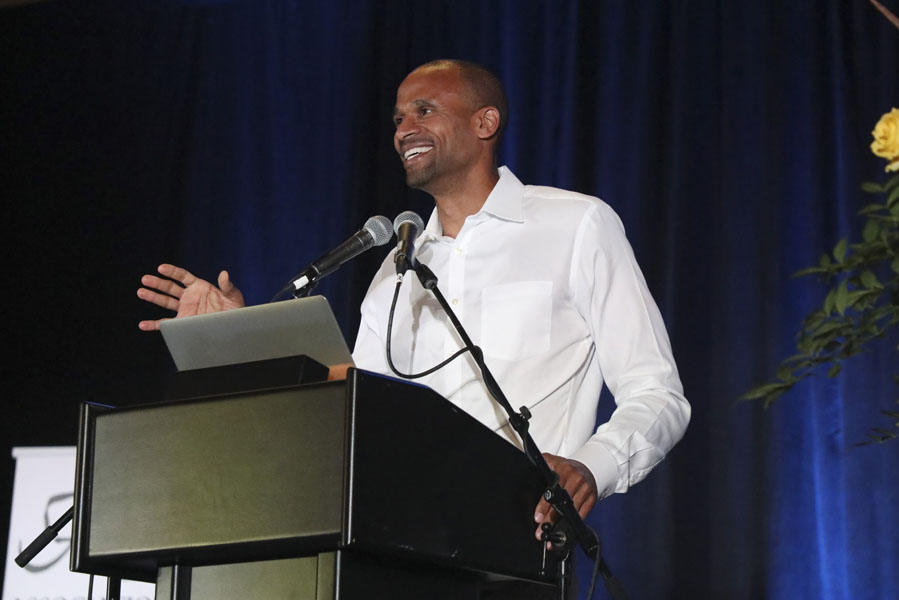

With a tone of inspiring challenge set by main speakers Firaydoun Javaheri and Andrew Young, themes of resilience and social justice were explored from a variety of perspectives throughout the 42nd annual conference of the Association for Baha’i Studies–North America, Aug. 9–12 in Atlanta.
Jesse Washington: “Who has ideas about what can be done?”
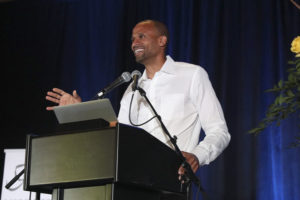
Documentary journalist Jesse Washington picked up a thread from Young’s talk — that we are all God’s children — and examined some obligations that spring from that truth.
The Universal House of Justice, the worldwide governing council of the Baha’i Faith, has advised Baha’is “not [to] allow their pursuit of noble aims and high aspirations to draw them into one side or the other of fruitless debates and contentious processes,” Washington noted in his own presentation.
“In the Baha’i writings, the response to racism is clear,” he said in response to a question from the floor. “We’re instructed to do constructive resilience, and we’d be well served to study that guidance.”
Over the years, Washington carried that guidance into his work at the Associated Press, and now at ESPN as a senior writer for The Undefeated, a web and multimedia platform exploring the intersections of race, sports and culture.
Journalism has never been objective, he noted. Writers choose subjectively what to ask and write about. But the overarching duty is to be fair, and news outlets fail in that duty when “everything is framed in conflict” and they “set themselves up as referees in that fight.”
Instead, said Washington, he strives to “go deeper” and “give people their say and see the humanity in them” — the aim being to “nurture and edify” en route to identifying solutions. By now “there’s no need to point out problems,” he said. “Who has ideas about what can be done?”
Echoing an earlier comment by Andrew Young that sports should be a unifier, Washington said, “The key to victory is unity. Anything that detracts from unity holds us back from that goal.”
Four other plenary presentations brought into focus what can be done to create understanding of what has brought humanity to this point and what practical steps can be taken to move humanity to the next stage in its development.
Depicting resilience: “An opportunity to begin anew”
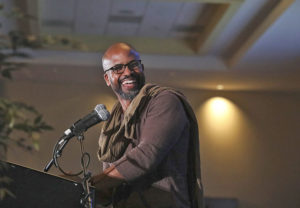

Masud Olufani, a nationally recognized multimedia artist based in Atlanta, demonstrates through his work how depictions of oppression and resilience aid a necessary process of remembrance and healing for all.
The most important relationship in life is between one’s soul and God, he said. In trying to live the teachings of Baha’u’llah, he said, he sometimes succeeds and sometimes fails but rises each day with “an opportunity to begin anew.”
Olufani said forgiveness and patience — for ourselves and others — are key, and an artist is uniquely positioned to “reveal what had been hidden and point a finger toward a larger reality.” Light, he said, is the most important element of any art because it clarifies and illuminates and, ultimately, facilitates healing.
Race amity: “When people crossed the barriers”
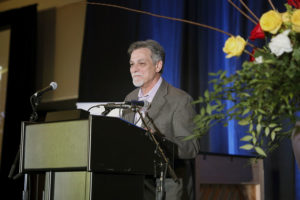

Using cinema to illuminate an oft-overlooked tradition of race amity in the United States, William Smith and Craig Rothman co-executive produced the film An American Story: Race Amity and the Other Tradition, which was shown to conference-goers.
To preface the screening, Rothman outlined stories over four centuries of how people of disparate backgrounds have worked together for mutual benefit: a multiracial community in 1600s Virginia; a colonist-Indian alliance on the American frontier in the 1700s; the joint quest of Irish liberation champion Daniel O’Connell with African American abolitionist and orator Frederick Douglass in the 1800s; and an Anglo-Latino collaboration among organizers Fred Ross, Cesar Chavez and Dolores Huerta to improve the lot of farm workers in the 1960s and beyond.
Many such stories of “points in history where people of different cultures crossed the barriers and created collaborations” remain to be told, said Rothman, and the Baha’i Faith is part of the story as an “incubator for real change.”
Oneness and social identity: “Expanded vision of possibility”
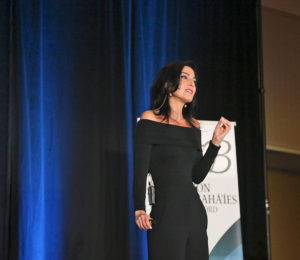

Shahrzad Sabet, in her research as a fellow at the University of Maryland’s Baha’i Chair for World Peace program, explores the concept that social identity and the oneness of humankind are not mutually exclusive — “reconciling the universal with the particular,” she calls it.
Tribal identity and prejudice is nothing new, but the way it has “disrupted and shaped developments” is accelerating, she said. How can the tension between identity and oneness be resolved? Sabet rejects the theory that the best we can hope for is a “globally sensitive patriotism” and said the Baha’i teachings call instead for a social identity based on membership in the human race.
Within a unified world, diversity actually thrives, said Sabet. “In oneness we find a vastly expanded vision of possibility,” she said. As proof she pointed to the community-building process being pursued by Baha’is and friends in thousands of neighborhoods worldwide.
Welcoming refugees: “Y’all means all”
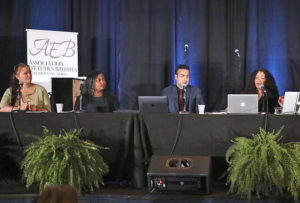

That process was on display in a presentation by Soroosh Behshad, Lauretta George, Jasmine Miller-Kleinhenz and Shadi Salehian on their experience in building community with refugee populations in Clarkston, an Atlanta suburb that Salehian said has embraced with a “y’all means all” attitude the 45 percent of its residents who are foreign born.
Clarkston’s refugees “have gone through so much and need true friends,” said George, but their “great sense of community and service to each other” comes through. Miller-Kleinhenz described how many “work 12 hours a day in a chicken factory two hours away,” but find time to involve themselves and their children in the core activities of community building.
One can see here how local community building, social action (in this case, including the provision of medical services) and learning to engage in discourse (including elevating conversations on the often fraught subject of immigration) go hand in hand. As participants “move to the forefront of those efforts,” said Salehian, “much more will happen” to make Clarkston a better place to live for all.
“We are the same person”
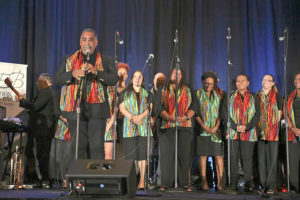

Choral singing from the African American traditions of gospel and jazz sent conference-goers home with uplifted spirits and renewed determination to work for justice.
Backed by horns, guitars, keyboards and percussion, the Atlanta Baha’i Choir sang and swayed their way into listeners’ hearts — especially those of the many youngsters who thronged the area in front of the stage.
“Be thou content with Me,” the choir sang in devotion to God. “We are the same person,” a second number avowed. And, went another refrain, “The world is a place for the whole human race to live and relate as brothers and sisters.”
Reginald Colbert led the choir and, with Natalie Colbert, brought many other local artists to contribute to the unique flavor of this year’s conference during devotions and elsewhere.


![]()
![]()
Whether you are exploring the Bahá'í Faith or looking to become an active member, there are various ways you can connect with our community.
Please ensure that all the Required Fields* are completed before submitting.